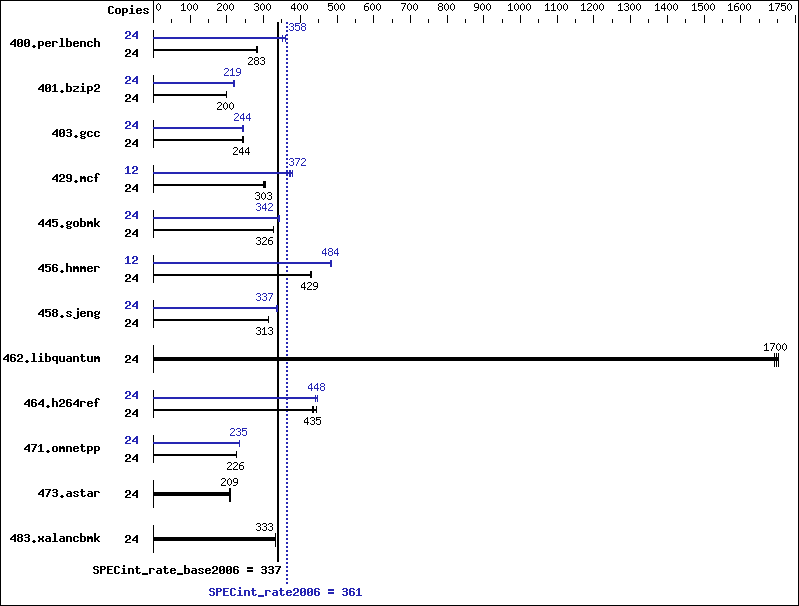| CPU2006 license: | 20 | Test date: | Apr-2011 |
|---|---|---|---|
| Test sponsor: | Bull SAS | Hardware Availability: | Mar-2010 |
| Tested by: | Dell Inc. | Software Availability: | Jan-2011 |

| Hardware | |
|---|---|
| CPU Name: | Intel Xeon X5660 |
| CPU Characteristics: | Intel Turbo Boost Technology up to 3.20 GHz |
| CPU MHz: | 2800 |
| FPU: | Integrated |
| CPU(s) enabled: | 12 cores, 2 chips, 6 cores/chip, 2 threads/core |
| CPU(s) orderable: | 1,2 chips |
| Primary Cache: | 32 KB I + 32 KB D on chip per core |
| Secondary Cache: | 256 KB I+D on chip per core |
| L3 Cache: | 12 MB I+D on chip per chip |
| Other Cache: | None |
| Memory: | 48 GB (12 x 4 GB 2Rx4 PC3-10600R-9, ECC) |
| Disk Subsystem: | 1 x 146 GB 15000 RPM SAS |
| Other Hardware: | None |
| Software | |
|---|---|
| Operating System: | SUSE Linux Enterprise Server 11 SP1 (x86_64), Kernel 2.6.32.12-0.7-default |
| Compiler: | Intel C++ Compiler XE for applications running on IA-32 Version 12.0.1.116 Build 20101116 |
| Auto Parallel: | No |
| File System: | ext3 |
| System State: | Run level 3 (multi-user) |
| Base Pointers: | 32-bit |
| Peak Pointers: | 32/64-bit |
| Other Software: | Microquill SmartHeap V9.01 |
Results Table
| Benchmark | Base | Peak | ||||||||||||
|---|---|---|---|---|---|---|---|---|---|---|---|---|---|---|
| Copies | Seconds | Ratio | Seconds | Ratio | Seconds | Ratio | Copies | Seconds | Ratio | Seconds | Ratio | Seconds | Ratio | |
| Results appear in the order in which they were run. Bold underlined text indicates a median measurement. | ||||||||||||||
| 400.perlbench | 24 | 833 | 281 | 830 | 283 | 829 | 283 | 24 | 667 | 352 | 654 | 359 | 654 | 358 |
| 401.bzip2 | 24 | 1160 | 200 | 1157 | 200 | 1157 | 200 | 24 | 1062 | 218 | 1058 | 219 | 1055 | 220 |
| 403.gcc | 24 | 798 | 242 | 793 | 244 | 790 | 245 | 24 | 789 | 245 | 798 | 242 | 791 | 244 |
| 429.mcf | 24 | 729 | 300 | 719 | 304 | 723 | 303 | 12 | 295 | 372 | 289 | 379 | 294 | 372 |
| 445.gobmk | 24 | 773 | 326 | 771 | 326 | 772 | 326 | 24 | 733 | 344 | 737 | 342 | 740 | 340 |
| 456.hmmer | 24 | 522 | 429 | 521 | 429 | 522 | 429 | 12 | 231 | 485 | 232 | 483 | 231 | 484 |
| 458.sjeng | 24 | 928 | 313 | 929 | 313 | 930 | 312 | 24 | 860 | 338 | 863 | 336 | 863 | 337 |
| 462.libquantum | 24 | 293 | 1700 | 294 | 1690 | 292 | 1700 | 24 | 293 | 1700 | 294 | 1690 | 292 | 1700 |
| 464.h264ref | 24 | 1195 | 445 | 1220 | 435 | 1227 | 433 | 24 | 1201 | 442 | 1186 | 448 | 1186 | 448 |
| 471.omnetpp | 24 | 664 | 226 | 664 | 226 | 665 | 226 | 24 | 639 | 235 | 638 | 235 | 640 | 234 |
| 473.astar | 24 | 805 | 209 | 810 | 208 | 808 | 209 | 24 | 805 | 209 | 810 | 208 | 808 | 209 |
| 483.xalancbmk | 24 | 498 | 333 | 498 | 332 | 497 | 333 | 24 | 498 | 333 | 498 | 332 | 497 | 333 |
Submit Notes
The config file option 'submit' was used. numactl was used to bind copies to the cores
Operating System Notes
'ulimit -s unlimited' was used to set the stacksize to unlimited prior to run 'mount -t hugetlbfs nodev /mnt/hugepages' was used to enable large pages echo 10800 > /proc/sys/vm/nr_hugepages export HUGETLB_MORECORE=yes export LD_PRELOAD=/usr/lib64/libhugetlbfs.so
Platform Notes
BIOS Settings: Power Management = Maximum Performance (Default = Active Power Controller) Data Reuse = Disabled (Default = Enabled)
General Notes
The Dell PowerEdge R610 and the Bull NovaScale R440 F2 models are electronically equivalent. The results have been measured on a Dell PowerEdge R610 model Binaries were compiled on RHEL5.5
Base Portability Flags
| 400.perlbench: | -DSPEC_CPU_LINUX_IA32 |
| 462.libquantum: | -DSPEC_CPU_LINUX |
| 483.xalancbmk: | -DSPEC_CPU_LINUX |
Base Optimization Flags
C benchmarks:
| -xSSE4.2 -ipo -O3 -no-prec-div -opt-prefetch -B /usr/share/libhugetlbfs/ -Wl,-hugetlbfs-link=BDT |
C++ benchmarks:
| -xSSE4.2 -ipo -O3 -no-prec-div -opt-prefetch -Wl,-z,muldefs -L/smartheap -lsmartheap -B /usr/share/libhugetlbfs/ -Wl,-hugetlbfs-link=BDT |
Peak Compiler Invocation
C benchmarks (except as noted below):
| icc -m32 | |
| 400.perlbench: | icc -m64 |
| 401.bzip2: | icc -m64 |
| 456.hmmer: | icc -m64 |
| 458.sjeng: | icc -m64 |
C++ benchmarks:
| icpc -m32 |
Peak Portability Flags
| 400.perlbench: | -DSPEC_CPU_LP64 -DSPEC_CPU_LINUX_X64 |
| 401.bzip2: | -DSPEC_CPU_LP64 |
| 456.hmmer: | -DSPEC_CPU_LP64 |
| 458.sjeng: | -DSPEC_CPU_LP64 |
| 462.libquantum: | -DSPEC_CPU_LINUX |
| 483.xalancbmk: | -DSPEC_CPU_LINUX |
Peak Optimization Flags
C benchmarks:
C++ benchmarks:
| 471.omnetpp: | -xSSE4.2(pass 2) -prof-gen(pass 1) -ipo(pass 2) -O3(pass 2) -no-prec-div(pass 2) -prof-use(pass 2) -ansi-alias -opt-ra-region-strategy=block -Wl,-z,muldefs -L/smartheap -lsmartheap |
| 473.astar: | basepeak = yes |
| 483.xalancbmk: | basepeak = yes |
